#Jewish dietary law
Text

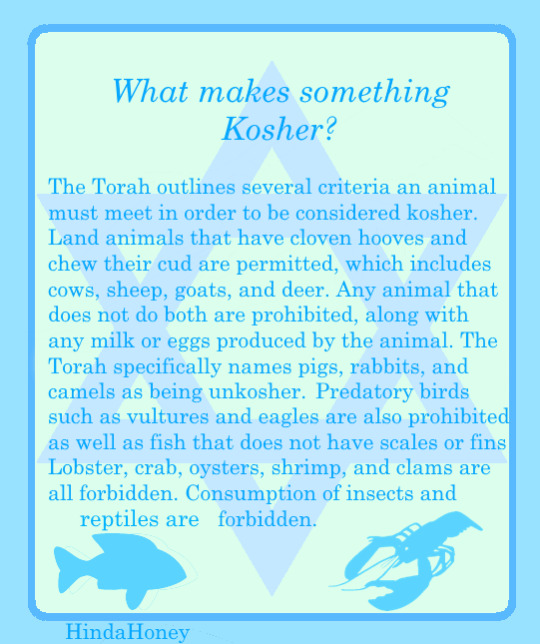


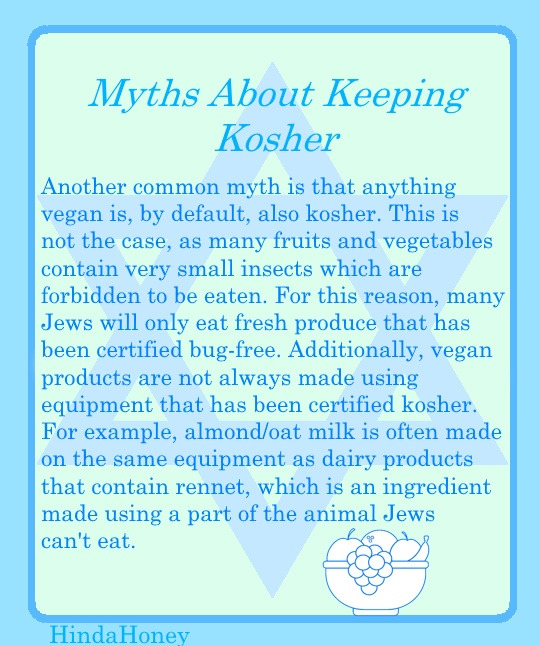
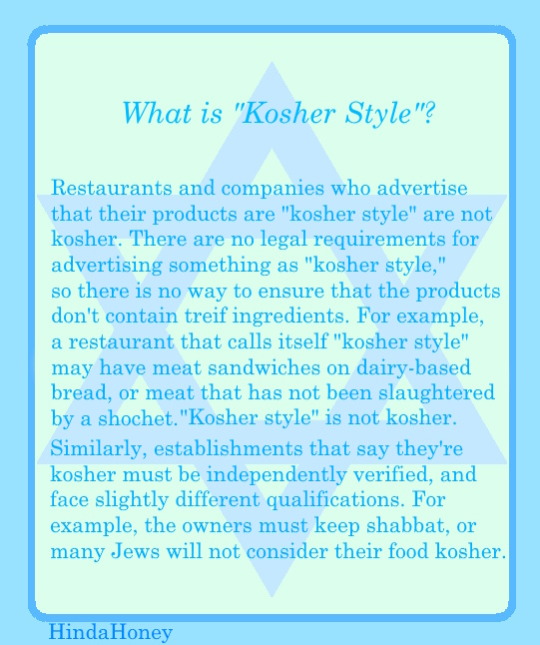

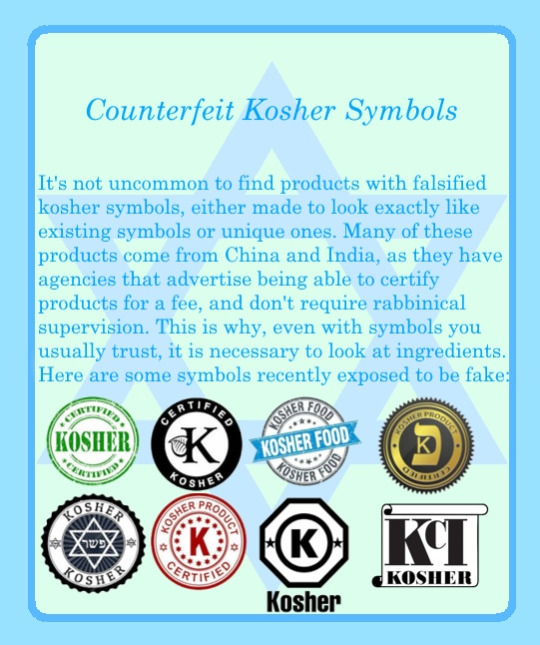

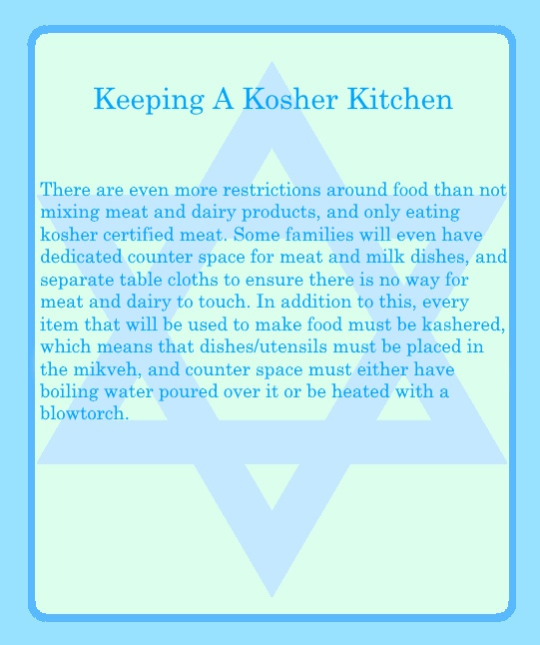
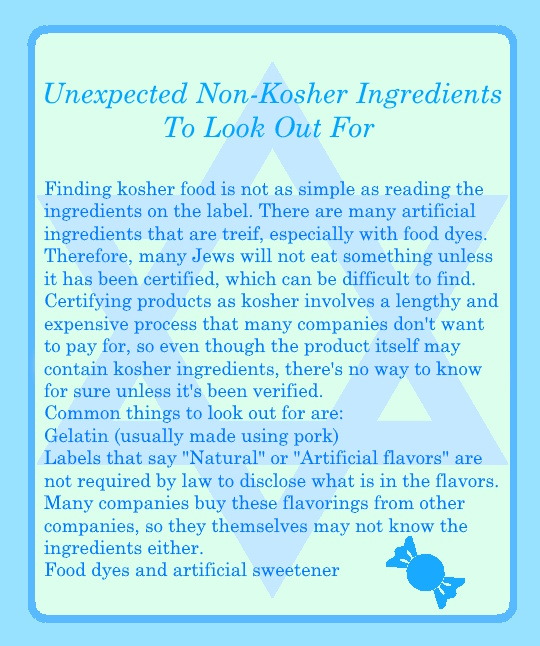

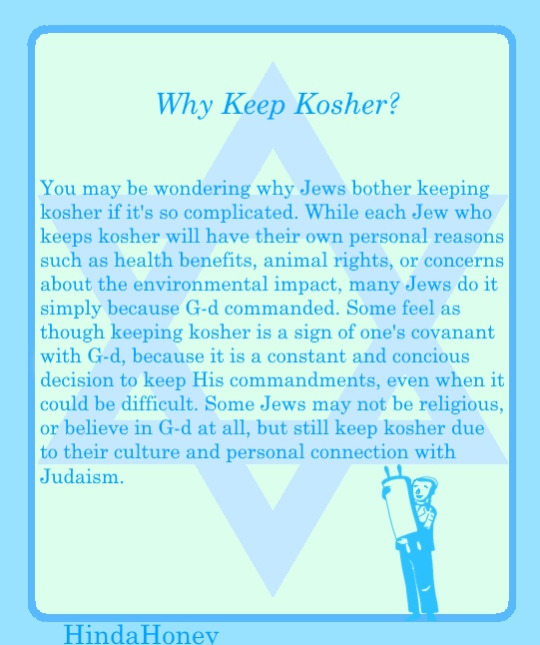

Here is a brief, non-comprehensive introduction to what "keeping kosher" means! A few things worth noting: the way people keep kosher can vary by minhag (custom), such as Sephardi Jews not eating fish with dairy, while Ashkenazi Jews will, but won't eat fish and meat on the same plate. I didn't get into kosher for Passover and the differences between minhag because it's an incredibly complicated topic, and the same applies for things like cholov yisrael, why chicken is fleishig but fish is pareve, and why some agencies are more trusted than others (Hebrew National, I'm looking at you). For a more detailed explanation, below the cut I have listed my sources. I hope you learned something new, thanks for reading!
If you liked this, you may also like my post about Shavuot and tzniut.
Sources:
The Basics of a Kosher Lifestyle
Kashrut: Jewish Dietary Laws - Judaism101
Kosher Certification, Orthodox Union
Kosher Flavors and Additives, Star-K
Orthodox Union: How To Handle Fake Kosher Symbols
WARNING: Fake Kosher Symbols Appearing on Products
#THIS TOOK FOREVER#jews#judaism#jumblr#jewish#frumblr#jewish history#jewish art#jewblr#judaica#kosher#keeping kosher#j tag#jewish stuff#jew stuff#jew tag#my post
649 notes
·
View notes
Text
Being a secular Jew in places where there aren't a lot of Jews to begin with.
This has been on my mind a lot these past few months. I am originally from the Philly area, which has a large Jewish population, and grew up surrounded by secular and religious Jews. However, in pursuing my career I've moved across the USA and lived in the South East, the Midwest, the Great Plains, and the Central Southern region. In all of these areas I have been the only Jew my new social circle has met, and on every occasion they have this perceived stereotype of what a Jew is that is contradictory and they don't even know it.
I've stated before that I grew up in the Reconstructionist movement, but in all honesty I have always been a secular Jew and neither myself nor my family practiced Halaka (even my Conservative grandparents didn't, nor did my great-grandparents). Part of this is due to the culture in the north east, the pseudo-assimilation, and the integration of Jewish culture with many other cultures. I grew up eating cheesesteaks and hoagies from Jewish delis. I worked in a deli that sold kosher products on one side and cured pork products on the other. Bagel sandwiches with bacon? Absolutely. Were there people who kept kosher in my community and social circle? Of course, but they got a steak sandwich instead of a cheesesteak and we thought nothing of it.
But moving out of the area?
Hoo boy.
I would eat bacon and goyim would absolutely freak out on me. "Aren't you Jewish?! YOU CAN'T EAT BACON!". Not realizing that there were Jews who didn't abide by those rules. They would then tell me all about Judaism from the TV they watched and/or other media they consumed, and it'd always have a scene of secular New York Jews eating pepperoni pizza. They literally had an example right there in front of them and they didn't understand. I remember even bringing it up to a friend and they went "wait, pepperoni is made from pork?" That alone made me take psychic damage.
So this is for my goys out there who seem to think every Jew keeps dietary laws and restrictions. We don't. We have nothing against those that do either. We're all one big tribe with a lot of variety in it.
But we do all have IBS and are lactose intolerant.
41 notes
·
View notes
Text
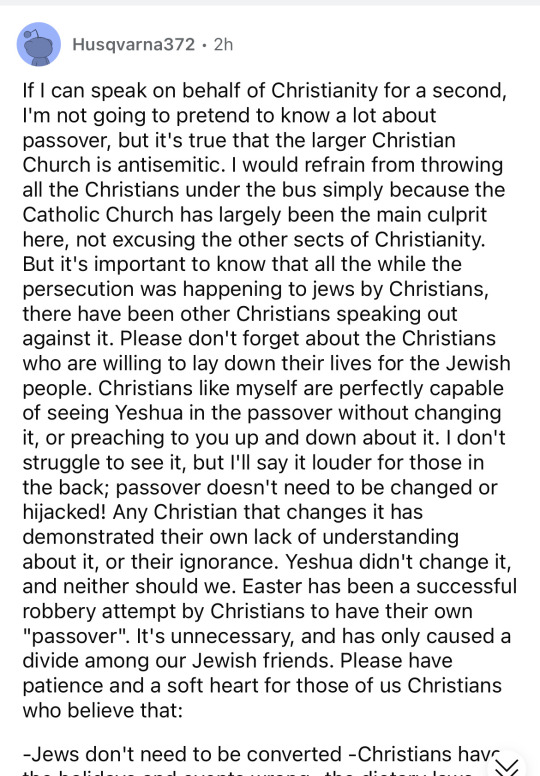
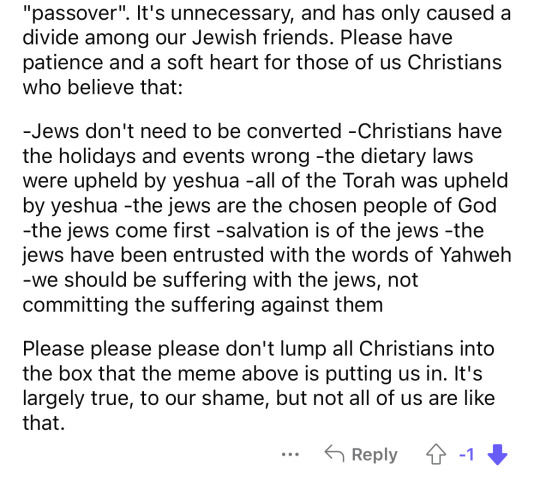
Here’s an interesting one-is this antisemitism? I think so. Let’s discuss:
First, the context. This comment was left on a post containing this meme, poking fun at the messianic “Jews” (they aren’t Jewish) and antisemitic Christians that appropriate Pesach.

Now. This person does make a few correct statements, and I’ll give them credit. They’re right that a lot of Christians and Christianity are antisemitic. But with that out of the way, let’s look at the myriad of ways they’re so very wrong:
I'm not going to pretend to know a lot about Passover
User admits that they are not qualified to be making judgements. As a Christian it isn't their place to tone police Jews anyways, but especially since they admit that they have no idea what they're talking about.
I would refrain from throwing all Christians under the bus
I'm sure they would. That isn't what is happening though, and framing it like this highlights their defensiveness- they aren't trying to have a productive conversation, they just don't like seeing Christianity being portrayed this way. Playing the victim, and not for the last time.
The Catholic church has largely been the main culprit here
Interestingly, there is a Catholic elsewhere in the thread blaming the Protestants. Typical Protestant vs. Catholic stuff, and this user is using it to attempt to distance themself from the "bad" Christians. Also, in my experience, almost every Christian "seder" I've seen or heard of has been held by a Protestant sect of some sort.
it's important to know that all the while the persecution was happening to jews by christians, there have been other christians speaking out against it.
More of the same, see above. "not all Christians!"
Please don't forget about the Christians who are willing to lay down their lives for the Jewish people.
Here's where the fetishization starts. Also, literally nobody asked you to do that, don't use us to feed your martyr complex. Also also, where exactly are these Christians, because they've been doing a shitty job.
Christians like myself are perfectly capable of seeing Yeshua in the Passover without changing it, or preaching to you up and down about it.
And this is where the explicit antisemitism starts, as opposed to the red flags we've been seeing. This person, based on their language, seems to be some sort of "Torah believing Christian"- something inherently appropriative and antisemitic.
Furthermore, YOU SHOULD NOT BE SEEING JESUS IN PASSOVER. That is, at best, idiotic, and at worst, actively antisemitic. It's certainly supercessionist. JEWISH TEXTS DO NOT PROPHESIZE JESUS. Christians should not be touching Pesach uninvited in ANY way, regardless of if they change things or not.
Yeshua didn't change it and neither should we
This person demonstrates an astounding level of ignorance. Any modern Seder would HAVE to be different than any Seder Jesus might have held (assuming he even existed), because it is impossible to do it like him. There is no temple to offer animal sacrifices at, like there would have been at the time. Regardless, not only should Christians not be changing seders, they shouldn't be touching it.
They then rant for a while about how Easter is bad. Which. My dude. That's your holiday. Go fuck around with that and leave Jews alone.
Please have patience and a soft heart for Christians who believe that:
More "not all Christians", this time with an added level of playing the victim. Hard pass.
-Jews don't need to be converted
Even stopped clocks are right twice a day.
-Christians have the holidays and events wrong
Uh? No? Is this some weird Christian intracommunity thing? Your holidays are your holidays, leave ours alone.
-the dietary laws were upheld by yeshua
Regardless of if this is true or not, Jesus was Jewish. This poster isn't. Kosher is for Jews. Christians aren't entitled to Jewish practice just because they worship a Jew.
-all of the torah was upheld by yeshua
see previous bullet point.
-the Jews are the chosen people of God
Typical Christian misunderstanding of "Chosen". "Chosen" to uphold the mitzvot, not to be better, or put on a pedestal. This is another example of how they fetishize Jews, and it does not get better.
-the Jews come first
See previous bullet point. Fetishization like this is disgusting and harmful. It removes humanity and personhood from Jews, instead presenting us as some mystical object of worship that we never claimed to be and can never live up to. We are not a zoo exhibit, we are a vibrant and living culture.
-salvation is of the Jews
See previous bullet point. We are people, not a tool for your salvation.
-the Jews have been entrusted with the words of Yah*weh
See previous bullet point. Also super disrespectful to just throw that name around in Jewish spaces, but I don't know what I expected from an antisemitic, philosemitic Jew fetishist.
-we should be suffering with the Jews, not against them
WE ARE NOT FUEL FOR YOUR MARTYR COMPLEX. Plenty of Jewish suffering would be alleviated if Christians like this person would just leave us alone. But they don't actually want Jewish suffering to stop, because then they'd lose a tool and a way to play victim.
they end with a plea not to lump all Christians together with the "bad" ones- something literally nobody was doing. Once again, it's a lot of "Not all Christians!!!" and their own self-victimhood. They say not all Christians are "like that", which is true. But this one certainly is.
Chag Pesach sameach everybody, and stay off the fuss bus.
#antisemitism#christian antisemitism#cultural appropriation#passover#reddit#messianic judaism#<they aren't jews btw#philosemitism#long post#religious antisemitism
260 notes
·
View notes
Note
I don't think you were ever asked this before. Could a Jewish person eat at a halal restaurant, and a Muslim at a kosher restaurant?
Kashrut is completely different from Muslim dietary laws, because of the various prohibitions in Kashrut that is not considered prohibited within Islamic law, such as mixing meat with dairy. Not only that, but for someone to perform the ritual slaughter (schechita) you require a schochet, while in the case of Islamic ritual slaughter (Zabitha), any Muslim can perform the slaughter. With that said, I don't think Halal food is considered Kosher to Jewish people.
As for Muslims, any food from the people of the Book is permissible as long as it has undergone a ritual slaughter and provided the butchers are ritually pure. In most cases, any slaughtered food from Christians are considered impermissible, since majority of them do not follow a dietary law. Jewish people have a much stricter rule regarding Kashrut, thus any food considered Kosher is Halal by majority of scholars. According to most Shi'a scholars, it is permissible to eat from the food provided by the People of the Book with the exception of meat.
130 notes
·
View notes
Text
It’s remarkable how just a handful of ingredients — celery, onion, carrots, mushrooms, barley and water — can truly transform into something hearty and nourishing. This isn’t unlike other Jewish foods, like cholent or chicken soup; Jews are masterful at transforming the ingredients on-hand into dishes that feed bellies and souls.
I am sure you have heard of mushroom barley soup, maybe enjoyed a bowl at your local deli or diner, or perhaps your grandmother made it from scratch. But did you know that mushroom-barley soup, or krupnik, is even more Jewish than matzah ball soup?
As Joel Haber explains in this piece, krupnik is a simple and hearty Polish soup made from barley and various root vegetables. Eastern European Jews had a strong affinity for mushrooms, since they were rich, nutritious and, best of all, they grew abundantly in local wooded areas, making them free.
Making this soup without meat also allows it to be pareve, so it can be eaten with either dairy or meat meals according to kosher dietary laws. While non-Jews may have made a vegetarian version if they couldn’t afford meat, most Polish recipes stress the importance of both meat and bones to create the proper consistency, making the vegetarian version distinctly Jewish.
This soup is ideal for so many things: a comforting meal train meal, paired with crusty bread and a salad; easy to make as a big batch to enjoy all week for lunch; or when you want to hear your kids complain “I don’t like mushrooms,” and then eat the barley and carrots all around those carefully sautéed mushrooms.
Notes:
Anyone who has watched “Julie & Julia” knows you don’t want to crowd your pan when cooking mushrooms. I cook this quantity of mushrooms in three batches to allow them enough space to caramelize slightly on each side.
I chose to make this recipe with a combination of white mushrooms and baby bella mushrooms. You can absolutely mix different types of mushrooms based on your taste (or what you have on hand), as long as the total quantity is around 1 lb.
If you want to turn the mushroom flavor up even more, you could add some rehydrated porcini mushrooms as you sauté the mushrooms. You can also add some of the hydrating mushroom liquid into the both for extra umami.
To make this soup pareve (non-dairy), just omit the butter.
This soup keeps well in the fridge for 3-5 days and can be frozen; you may just need to add some additional water or broth when reheating.
44 notes
·
View notes
Text

Saint Cornelius the Centurion
1st century
Feast Day: October 20
Patronage: soldiers, benefactors, philanthropists, Jewish converts
Saint Cornelius the Centurion was the first non-Jewish convert to Christianity. He was an Italian Captain of the Roman Army. As related in the Acts of the Apostles, an angel appeared to him and invited him to seek St. Peter for instructions and baptism. At the same time, St. Peter had a vision from God that released the Jews and converts from the strict dietary Mosaic laws. After St. Peter baptized Cornelius and his family the Holy Spirit descended upon all of them.
Prints, plaques & holy cards available for purchase here: (website)
56 notes
·
View notes
Text


All Abrahamic religions claim to be monotheistic, worshiping an exclusive God, although one who is known by different names. Each of these religions preaches that God creates, is one, rules, reveals, loves, judges, punishes, and forgives.
However, although Christianity does not profess to believe in three gods—but rather in three persons, or hypostases, united in one essence—the Trinitarian doctrine, a fundamental of faith for the vast majority of Christian denominations, conflicts with Jewish and Muslim concepts of monotheism.
Since the conception of a divine Trinity is not amenable to tawhid, the Islamic doctrine of monotheism, Islam regards Christianity as variously polytheistic.

Judaism and Islam have strict dietary laws, with permitted food known as kosher in Judaism, and halal in Islam. These two religions prohibit the consumption of pork; Islam prohibits the consumption of alcoholic beverages of any kind. Halal restrictions can be seen as a modification of the kashrut dietary laws, so many kosher foods are considered halal; especially in the case of meat, which Islam prescribes must be slaughtered in the name of God. Hence, in many places, Muslims used to consume kosher food. However, some foods not considered kosher are considered halal in Islam.

With rare exceptions, Christians do not consider the Old Testament's strict food laws as relevant for today's church; see also Biblical law in Christianity. Most Protestants have no set food laws, but there are minority exceptions

The Seventh-day Adventist Church (SDA) embraces numerous Old Testament rules and regulations such as tithing, Sabbath observance, and Jewish food laws. Therefore, they do not eat pork, shellfish, or other foods considered unclean under the Old Covenant. The "Fundamental Beliefs" of the SDA state that their members "are to adopt the most healthful diet possible and abstain from the unclean foods identified in the Scriptures".

Proselytism
Judaism accepts converts, but has had no explicit missionaries since the end of the Second Temple era.
Judaism states that non-Jews can achieve righteousness by following Noahide Laws, a set of moral imperatives that, according to the Talmud, were given by God[k] as a binding set of laws for the "children of Noah"—that is, all of humanity. It is believed that as much as ten percent of the Roman Empire followed Judaism either as fully ritually obligated Jews or the simpler rituals required of non-Jewish members of that faith.

Christianity encourages evangelism. Many Christian organizations, especially Protestant churches, send missionaries to non-Christian communities throughout the world. See also Great Commission. Forced conversions to Catholicism have been alleged at various points throughout history. The most prominently cited allegations are the conversions of the pagans after Constantine; of Muslims, Jews and Eastern Orthodox during the Crusades; of Jews and Muslims during the time of the Spanish Inquisition, where they were offered the choice of exile, conversion or death; and of the Aztecs by Hernán Cortés. Forced conversions to Protestantism may have occurred as well, notably during the Reformation, especially in England and Ireland
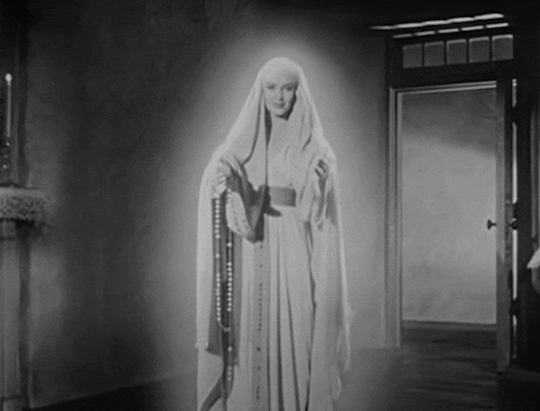
#kemetic dreams#islam#jews#judaism#talmud#christians#christmas#christianity#jesus christ#christian broadcasting network
42 notes
·
View notes
Note
Hello, I would like to ask if you have, or can suggest where to find, a simple glossary of common/basic Jewish terms to English? I’ve found myself infinitely scrolling your blog on mobile and while I’ve learned a lot from reading your answers, several of the terms go over my head
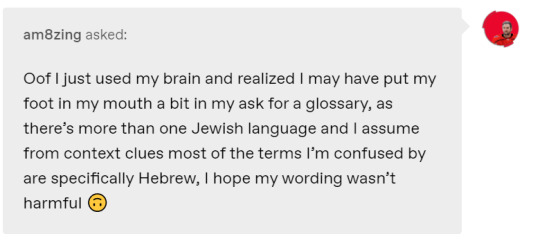
You're good! Yes, there's more than one Jewish language, and in fact there's so so many dialects of many different places Jews have had a diaspora population in. Here's a good glossery I found which includes a lot of common Hebrew and some Yiddish words. (Although Yiddish isn't the only Judeo-language.)
As for words I regularly use on my blog, here's a bit of a short glossery haha. I tried to think of words and phrases I regularly use, but I could have missed something.
Ashkenazi- refers to Jews descended from Jews who settled in Germany and Eastern Europe in the diaspora.
Ayin Hara- Evil Eye
Beit HaMikdash- Either of the two Jewish Temples from history that were both destroyed.
Chabad- A movement within Chassidism that follows the values and practices taught by the Lubavitcher dynasty of Rabbis, and especially the seventh and last Rabbi in the dynasty, Rabbi Menachem Mendel Schneerson.
Chag- holiday
“Chag Sameach”- “Happy Holiday”
Chanukiyah- The eight branched candelabra with a shamash used on Chanukah
Charedi- Jews within Orthodox Judaism who observe Halakha more strictly and often reject modern and secular values and practices.
Chassidic- Jews within Orthodox Judaism categorized by increased spiritual and mystical practice that started in Eastern Europe in the 18th century that utilizes Kabbalah and “Chassidut”, which was first taught by Rabbi Yisrael Baal Shem (The Baal Shem Tov)
Conservative (Masorti outside of N. America)- A branch of Jewish observance which views Jewish practice and law through both a traditionalist and critical lens. It emphasizes the importance of both preserving Jewish traditions and practice, while also making space for reinterpretation and analysis to align with modern values and ideas.
Davening- (Yiddish) praying
Golem- a creature made of clay that is created as a guardian of the Jewish people. Most famous golem is the Golem of Prague.
Goy- gentile
Halakha- Jewish law
Kabbalah- Jewish mystical tradition. Highly spiritual and exclusive even within Judaism.
Kashrut- Jewish dietary practice
Matrilineal- refers to Jews who were born Jewish through matrilineal descent. Matrilineal descent is the parameter for Jewish identity used by Orthodox and Conservative Judaism.
Menorah- lit. “lamp”. Used mainly to refer to the seven branches lamp used in the Beit HaMikdash or the Chanukiyah used on Chanukah.
Midrash- Broadly refers to Rabbinic exegesis of traditional Jewish texts (the Tanakh and some additional texts) with alternative interpretations of the text.
Minhag- Jewish custom.
Mitzvah- commandment.
Mizrachi- broad term referring to Jews descended from Jews who settled in Asia and North Africa in the diaspora. Sometimes used to distinguish between those who populations predated Sephardic presence, although other times is used inclusively of Sephardic Jews.
Orthodox- a branch of Jewish observance categorized by strict adherence to Halakha and traditional Jewish values.
Patrilineal- refers to Jews who were born Jewish through patrilineal descent.
Reform- a branch of Jewish observance that affirms the central tenets of Judaism while also acknowledging the diversity of Jewish practice and the need for adaptability in Jewish life and practice.
“Refua Shelemah”- Full recovery. Hebrew for “Get well soon”.
Rosh Chodesh- The ‘head’ of the month.
Sephardi- refers to Jews descended from Jews who settled in the Iberian Peninsula in the diaspora and those who settled in other lands following the expulsion of Jews from Spain and Portugal.
Shabbat- the Jewish Sabbath
Shofar- an animal horn traditionally made from a ram or kudu’s horn that is used in Jewish ritual.
Talmud- The most central text of Jewish law comprised of the recorded writings and debates of the Rabbis of the Jewish court during the Second Temple Period. Composed of the Mishna, which is written in Hebrew, and the Gemara, which is written in Judeo-Aramaic.
Tanakh- Acronym for Torah, Neviim, and Ketuvim. The canonized collection of Jewish texts: The five books of Moses, the Prophets, and Writings.
Yom Tov- lit. “good day.” Another word for holiday.
And as always, if there's any word or phrase you're confused by, you're welcome to ask.
Although, I do have a tag "#if jew know jew know" which I use for posts about more "inside" stuff only intended for other Jews to understand or relate to, so if you're not Jewish and don't understand something that uses that tag, that's alright, you're not supposed to understand.
[id in alt]
171 notes
·
View notes
Note
OH OH OH!!!! Jewish guy here too!! (/First of all, hello! how are you??/)
Can i just say that i absolutely love your headcanon about Ink? I never heard it before (//to be honest, never saw any religious headcanon in this fandom smh//) but already in love with it! Makes a lot of sense!(/For some reason, can't explain why./)
Anyways, this now made me think about Ink following other certain jewish traditions, like if he would eat ''Kosher'' foods for example...You know, the foods that conform to the Jewish dietary regulations of kashrut (dietary law) and the Torah!!! “Kosher” is a term used to describe foods that comply with dietary guidelines set by traditional Jewish law. These laws determine which foods may be consumed and how they must be produced, processed, and prepared.
//I think it would be very easy for Ink to follow those laws since he canonically doesn't need to eat and doesn't has a favourite food of any kind (/although, he seems to like burned food/). But i can also totally see him as someone who totally forgets to follow this tradition. Me too Ink, me too...//
Also, imagine that he also brought some 'jewish 'sensibilities' to his dads wedding, since he helped with the organization and stuff! (used the term 'sensibilities' since their wedding seemed more chatolic oriented). Maybe Ink made them break a glass! It's a traditional jewish wedding practice that signifies of happiness and reflection! Since he also seemed to have helped with the design of the wedding, it also featured a chuppah! (It's a canopy which the couple stands under during the ceremony!)
In more subtle ways however, i like to image that he also likes to rest and enjoy his hobbies within saturday! Basically, this practice is called 'Shabbat'! He also would be unable to use any type of electricity tho...
(sorry for the question long ask lmao got a lil carried away)
DONT APOLOGIZE THIS IS SO COOL!!!! I LOVE IT SM WHEN PEOPLE EXPAND ON HCS I LOVE RAMBLES. i absolutely love this yes. im not too aware of a ton of jewish traditions, i was raised christian and now i’m not exactly part of any religion, but i love love love looking into other religions and traditions and stuff so this is all very very cool to me!!!!!!!!!! i love the idea of ink including jewish traditions into his dads’ wedding too omg
#get carried away all you want this was so fun to read#again im not jewish so i can’t add onto this in a way that really matters#SO AGAIN PLS READ THE ASK!!!! ITS SUPER COOL#I LOVE THE EXPANSION ONTO THE IDEA AND EVERY SINGLE ASK I GET ABOUT THIS HC IS AWESOME#ink sans#jewish ink sans
13 notes
·
View notes
Note
I saw your reblog+tags and I'm curious: how does one play Minecraft with a Jewish twist? :0
Basically, I'm trying to play in a way that corresponds to Halakha (Jewish law), which for now mainly involves trying to simulate Shekhita (Kosher slaughter). I did a lot of research on the requirements for the type of blade (called Khalaf or Sakin Hashekhita depending on who you ask) as well as how it must be used and concluded that only a diamond or netherite sword with sharpness V was suitable for slaughtering a cow (as they deal 10 and 11 damage respectively and a cow has 10 health and it Must be a one hit kill to be kosher, additionally it cannot be a critical hit as that might count as excessive force which is forbidden).
There is so much fun to be had around Kashrut (the dietary laws) in Minecraft. Did you know you're not allowed to eat fruit from a tree until it is three years old? Thus, I can only eat apples from oaks that have existed for 36 lunar cycles (3*12 months).
I've tried playing with "must keep Shabbat" but honestly it's very annoying to once every 7th ingame day just not be able to do basically anything. Pretty much everything that can be done in Minecraft is prohibited on Shabbat, including Mining and Crafting. You can maybe go explore, but you can't take anything with you or pick up anything, or make plans for what to do after Shabbat with what you find, and you can only go by foot, which I think means you're not breaking the prohibition travel, but I'm not sure, I need to look into it. It's possible that enchanting would be allowed if you reaaally stretch the concept and try to define it as studying, which is encouraged on Shabbat. Anyway I'm currently ignoring the Shabbat part because it's annoying to keep track and there's nothing you can really do. (Not to mention if you want to properly observe Shabbat you do so with meals which in Minecraft means you need to fast all week to be hungry enough to eat several meals.)
Once I get a bit more set up I really hope to create some redstone thing at spawn that will count the days for me so I can incorporate holidays. Maybe. It would be fun to build a Sukka (hut) for Sukkot (holiday when you build and live in a hut for a week) in Minecraft, but I might end up just going by the real world calendar to make sure I have time to really celebrate ingame (especially since lunar cycles are 8 days in Minecraft which means I'll have barely any time between holidays, Sukkot alone would take up a whole month).
It's basically a fun roleplay twist and as a bonus I get to research and learn about different Mitzvot (commandments) and Minhagim (traditions) before I'm able to meet a rabbi and incorporate them into my own real life. I love learning about Halakha and Judaism and I love any excuse to ask all the silly questions about it. Like earlier today a friend and I were arguing about whether a gun that shoots blades could be used for kosher slaughter! Judaism is so great and appealing to my autism like it has probably the world's largest collection of commentary upon commentary about how to interpret the rules and what does it all mean and I could spend the rest of my life learning about it and while there are disagreements there's bound to be some answer to any question I have about an ambiguity of a rule and oh my autistic little heart.
But there's some stuff I don't feel comfortable doing yet, even in game, because they feel too important and exclusive to real Jews, such as Tzitzit (knotted strings that are attached to certain articles of clothing) on my Minecraft skin, though I drew on a kipa (traditionally a round flat little hat worn by men) because it is only a Minhag (tradition) and not a Mitzva (commandment) and I wear one in real life. I've been considering making a Mezuza (little container put on doorposts containing an important prayer and marked with the letter ש, it is a Minhag to kiss it when you pass it) by writing the Shema (the aforementioned prayer) in a book and putting the book in a barrel next to the door and then putting a button on the barrel and pressing it to kiss it and open the door, but it might also fall into this category and might have to wait until I'm further in my conversion.
Anyway thanks for listening to me infodump about Judaism, it will happen again. Also there are 613 Mitzvot in the Torah and countless more in rabbinical texts, just so you don't think I'm even scratching the surface here. This is a brief summary of scratching the surface. In Minecraft.
#ask the tooth folk#hoodieimp#Minecraft#Judaism#If you're Jewish and I forgot I'm sorry for explaining Judaism to you I wanted to make it accessible and also infodump#I love Judaism so much hhhhhhhhhhhhh#tw religion#sfw
66 notes
·
View notes
Note
How strict do you think Bucky is on obeying the laws of Kashrut? I’m assuming you hc him following the obvious stuff like not mixing meat and dairy and anything with pork/shellfish, but how about the more obscure stuff? Does he verify his fruit and veg to make sure there aren’t any bugs? Does he only buy milk that’s Chalav Israel? These are just examples, if there’s anything else you hc I’d love to know ^_^
That's a really good question!
I think Bucky follows kashrut the way his family did when he was growing up during the depression (when food scarcity meant observance of more obscure and strict interpretations of kosher laws were not entirely feasible), with moves to stricter observance now that money isn't a concern.
Bucky definitely keeps a kosher kitchen as best he can, it gives him much needed structure and is incredibly spiritually fufiling.
When designing their kitchen and buying everything they need, Bucky is proactive in planning for the things required to prevent cross-contamination of meat and dairy, such as:
The cabinet, drawer, organizational containers/trays and counter space needed to keep chalav (dairy) and basar (meat) separate
A double metal sink and two separate dishwashers
Two distinct sets of silverware
Two different coloured sets of utensils/cooking equipment
Different coloured sets of pots and pans
Visually distinct dishware (shape-wise) basar are square, chalav are round
Different coloured mugs and glasses
An oven (with a Shabbat mode) that can easily be properly kashered
A fridge with the organizational capacity to keep meat and dairy separate
etc
Things like kosher produce are a more recent push and many kosher authorities believe it's going a bit too far, so I don't think Bucky would follow it. That isn't to say he doesn't thoroughly rinse his fruit and vegetables before eating them, though.
Shopping for food, he and Steve make sure to buy kosher meat, dairy and only kosher certified pre-prepared foods. Living just outside New York it's easy to find stores with a huge range of kosher products.
The increase in popularity and availability of non-dairy alternatives means they can keep kashrut while broadening their dietary horizons.
Bucky has his Ma's kosher cookbook, Steve's Ma's Irish cookbook, as well as a growing collection of more modern cookbooks and recipe cards that include Jewish food beyond the traditional Ashkenazi fare that he grew up with.
Some miscellaneous thoughts
Bucky is really into matzah, so they have a whole cupboard stocked with boxes and boxes of different flavours of manischewitz that he can snack on to his heart's content.
Before Passover each year Bucky and Steve sell their hametz to Sam.
Bucky makes the most incredible, mouth-watering brisket and Steve always jokes it's what made him fall in love with Bucky in the 30's.
They get bagels and lox from Russ & Daughters whenever they're in Brooklyn (Bucky will death glare at anyone who suggests he buy store-bought bagels).
#hope my prof would be proud im putting what i learned from him to good use lmfaooo#Assorted Jewish Writings - Misc#marvel#mcu#bucky#bucky barnes#james bucky barnes#james buchanan barnes#jewish bucky#jewish bucky barnes#jewish!bucky#jewish!bucky barnes#stevebucky#stucky
107 notes
·
View notes
Note
Why not just eat chocolate? Nobody will know and not eating things you like because of a religion seems kind of cruel? Obviously I get the pork thing - even though that stems from the time Piggys were gross and ate poop - but to not eat chocolate because men 3,000 ish years ago said 'Only eat simple bread and starve yourself" said so?
It just seems so wrong 😕 Religion should be about you and your god, not what people a long time ago said you can or can't do. I have this problem in my own faith. By rights I think it's a period of not indulgence is here or coming shortly. Yet I'm pretty sure main event guy wouldn't want people starving and whipping themselves over him. 🙄
80% of religions these days it going by what some man wrote or decreed, rather than about god and that is a giant same.
Please eat your eggs if you want. You shouldn't have to restrict yourself on word of what a group of men who lived 3000 years ago said.
there are so many things wrong with this ask but you sound so genuine and earnest and im just so fucking pissed right now that i have no choice but to answer asks in this horrible awful no good very bad new post format that im gonna make this brief.
1- i know i dont talk about it much anymore but i have my masters in jewish education and up until last year was working as a bar/bat mitzvah teacher and torah reader in my synagogue for the last like million years of my life. religion has never felt like a burden to me.
2- not eating piggies although its plausible does not necessarily come from the fact that theyre in close contact with poop. doesnt say anything about that in the biblical texts. keeping kosher is also not the same as the dietary restrictions for passover and the reasons for them are not necessarily related.
3 - not eating certain things (chametz - not "simple bread," its more complicated) on passover is not about starving yourself and its not about atonement (that holiday is in the fall), its about remembering important events in jewish history and keeping the sense memory of those events and lessons alive for thousands of years.
4- what religion is asking you to whip and starve yourself for god? sounds like a cult or a dan brown novel tbh
5- judaism is definitely based on shit some men wrote, but it most certainly was nowhere close to one man. we're talking lots and lots of very opinionated and highly intelligent and insightful men (also women if you know where to look, also some dumbass men) whose interpretations and decisions of law regarding how their society and religion could and should function without a central community or authority on earth were passed through millions of hands and thousands of more opinions through the centuries and enforced to many degrees in both extremes only to be falling apart in the last century or so thanks to inescapable global factors that have rolled through our disparate communities like indy's boulder on a rampage.
wait a minute i said this would be brief. fuck.
anywaynot eating my cadbury creme eggs is def not a burden i just enjoy complaining its probably all for the best.
also i hope this didnt come off rude i understand where you're coming from but i also invite you to do a little googling about judaism and the holiday of passover. happy holidays! ✡️🫓🍷
#jewish things#judaism#passover#personal#thoughts out loud#nice people#food mention cw#again i wasnt trying to sound antagonistic but please. religion is not always evil.#💗💗💗#wait wait#i also have to add that#many things we enjoy can be found in a kosher for passover version during the holiday#im sure if there was enough demand for cadbury creme eggs during passover someone might make it simply for the $$#unfortunately that will most definitely never happen s;dklfjgksdhfngjkfdh#but there is plenty of chocolate available to me on passover should i decide i need it#(i am not generally a chocolate girl. i just go through a yearly creme egg phase is all)
25 notes
·
View notes
Text
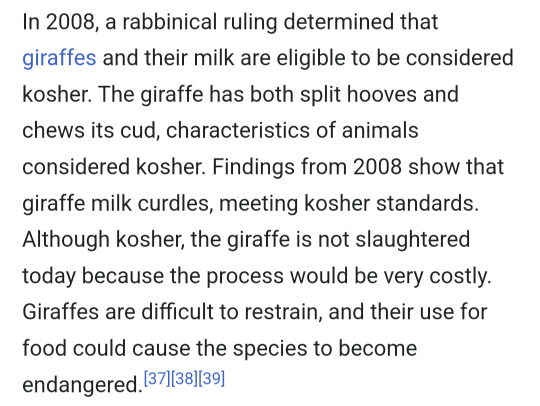
This is from the Wikipedia article on Jewish dietary laws and idk why I find the last 2 sentences here really funny. Like if we're including this factoid we also gotta explain why we don't eat giraffe meat, lest someone get the wrong impression
4 notes
·
View notes
Note
Why are scaless fish considered haram? I know you aren't google and all but I tried them and absolutely nothing shows up -_- but im very curious!! If it's no trouble
Keep in mind that only Shi'a Muslims and Jewish people hold this opinion. But to make it short, some animals are just not fit/meant for consumption (provided we are starving to death). There is a limitation for what is socially, culturally, and religiously acceptable as food. Christianity doesn't have a dietary law, but no Christian would find it acceptable to eat dogs. Islam simply puts a boundary for what is necessary for survival, and it is adequate. We just don't need to eat pork or scaleless fish.
57 notes
·
View notes
Text
Last week, the California Senate Education Committee passed the Halal and Kosher School Meals Act by a unanimous vote of 7-0.
The bill, which coincides with both the end of Ramadan and the beginning of Passover, requires California public schools to provide halal and kosher meal options to students if the school requires it.
“When suitable meals aren’t available for these students, they often have to go without eating at school, something that is fundamentally unfair and clearly detrimental to their educational experience,” said Senator Josh Newman, who also chairs the Senate Education Committee.
New California bill pushes for schools to give less homework
Both halal and kosher diets are religious guidelines regarding a mix of food preparation and ingredients that are considered permissible to use:
Kosher meals adhere to Jewish dietary law, which involves specific animal selection preparation methods and the prohibition of mixing meat and dairy.
Halal meals are considered permissible under Islamic Law. They include meat from animals slaughtered in a specific manner and exclude food like pork.
Research shows that many Jewish and Muslim students abide by Kosher and Halal practices.
A 2021 report by the Institute for Social Policy and Understanding (ISPU) found that 83% of American Muslims either only purchase halal-certified foods or prefer halal foods while still purchasing non-certified options if not religiously forbidden.
“There have been various times where at school I had to skip out on eating lunch because, by the time I got through the lunch line, everything I could eat was out,” said Rosa Haideri, a Muslim student from the Elk Grove Unified School District who testified at the hearing.
Another 2021 study from the Pew Research Center found approximately 22% of American Jews keep kosher in their homes.
“Every student deserves to feel supported and included at school,” Newman said. “Kids shouldn’t have to choose between hunger and adhering to their religious beliefs.”
According to the Senate of Education Committee, the bill will take effect in the 2025 -2026 school year. Schools where more than 5% of the population express a preference for halal or kosher options will be required to provide these meals.
_________________
Surprised this wasn't a thing already
6 notes
·
View notes